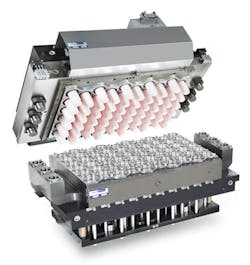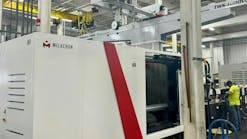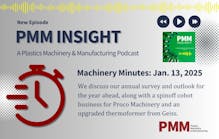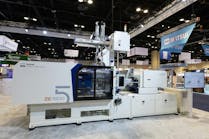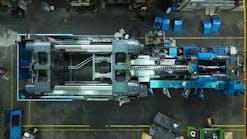The latest technology for thermoformed tooling isn't metal-based. It comes in the form of a new material for plug-assist thermoforming. Plug-assist is a technology where an additional material is placed on the positive or negative portion of the mold to achieve better molding characteristics such as improved part strength. This is increasing in importance as more processors are downgauging.
HYTAC-C1R has been on the market for a relatively short time. It is a high-performance, toughened, copolymer syntactic foam that is modified to provide high friction and the highest durability of any thermoset syntactic foam, say officials with CMT Materials Inc., Attleboro, Mass. It has very low thermal conductivity and is easy to machine without dust. It is very durable and easy to modify and polish.
The material originally was introduced in 2012 for use in deep-draw or zero-draft applications where high friction was required. But it never was commercialized to the extent that it should have been, says Conor Carlin, CMT sales and marketing manager.
Through last fall, the company conducted tests with chemicals firm Milliken & Co., Spartanburg, S.C. Specifically, the companies studied instances where PP sheet was clarified with Milliken's Millad NX 8000. The thermoforming trials were done with 1.39mm thick PP sheet. Officials wanted to see if the HYTAC-C1R plug assists could provide all the benefits of syntactic foam but without any loss in optical properties. The trials, conducted at uVu Technologies in Boca Raton, Fla., were successful.
Other benefits of plug assist include the reduction of cycle times, energy costs and starting gauge. CMT has seen an increase in demand due to a confluence of factors, says Carlin. New materials, new packaging designs and trends, and sustainability demands such as light-weighting are among the reasons.
"From the side of thin-wall packaging in general, there have been a lot of developments in new materials such as barrier films and other multi-layer plastics," he says. "These are typically more expensive than standard mono-layer materials, but they also require more attention to detail in the thermoforming process. A multi-layer sheet has different components that have different optimal thermoforming temperatures. Because we offer eight grades of syntactic foam, people are realizing that different plastics require different plugs.
"For example, we have PTFE-impregnated materials that are designed for multi-layer. The material properties allow for greater release or slip that helps to reduce or eliminate sticking. You wouldn't necessarily need to use this type of plug material for low-grade HIPS."
The market also is seeing more demanding applications and higher quality requirements. There is an internationalization of processes and standards from major consumer products companies like Unilever, Nestlé S.A. and MondelÄ“z International Inc. An increase in the use of clarified PP means that thermoformers have to be more careful about monitoring sheet temperature to create the highly transparent parts that are demanded by large end users such as Starbucks and McDonald's, for example.
"We have formulated HYTAC-C1R for specialized use in PP applications because it provides more stability and doesn't absorb as much heat in the process as solid polymers, which are sometimes used as plug assists. Additionally, tighter tolerances on parts that ultimately feed into form/fill/seal mean parts must be produced with consistency and repeatability," he says.
A few other trends are affecting the use of this technology. They include increasing consumption in emerging markets and a new generation of engineers working in thermoforming.
"In some ways, the new generation of process engineers and material engineers are arriving at decisions based on better data and a deeper understanding of the polymer science," says Carlin. "They have not had to rely on trial and error with commodity products like the pioneers in the industry."
During Chinaplas, held in May in Guangzhou, CMT's materials were being used in several booths of major thermoforming machinery makers, including Gabler, Illig, Kiefel and some Chinese OEMS.
Angie DeRosa, managing editor
Contact:
Contact: CMT Materials Inc., 508-226-3901, www.cmtmaterials.com
